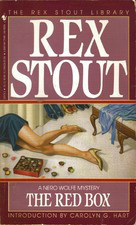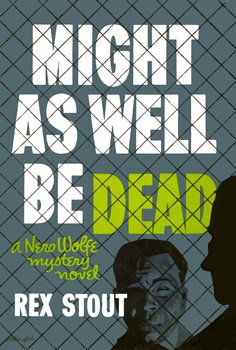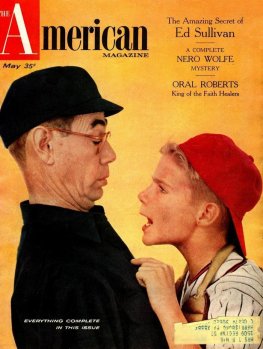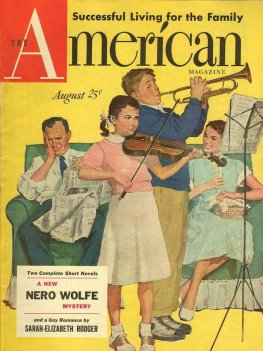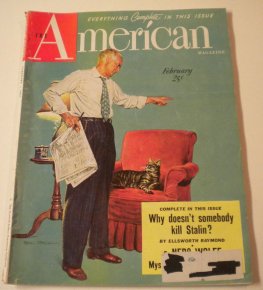Rex Stout
If Death Ever Slept
Introduction
IT IS NOW A commonplace to point out that Rex Stout fused the two great streams of English language detective fiction. In Nero Wolfe he creates a Holmesian genius, European born, who solves crimes through the application of superior intellect, in the ratiocinative tradition. In Archie Goodwin we have an American wiseacre who solves, or helps Wolfe solve, crimes through the application of superior toughness, in the hard-boiled tradition. One should not be too schematic here. Archie is smart and Wolfe is tough, but the generalization, I think, holds.
This would have been a clever contrivance in any case, but it would have been only that if Stout were not also quite a splendid writer. He wrote short and he wrote often, which tended to obscure the fact that he wrote well. Unless it leads to obscurity, brevity is rarely praised (or employed) in the journals of, ah, serious literary criticism, and frequency is often equated with frivolity. Thus it has been insufficiently observed in such circles that Stout created people you care about and want to see again. I have read all of the thirty-something Nero Wolfe novels several times. It is not the plots. The plots are ingenious enough, but Wolfes solutions are made to seem more remarkable than they might otherwise, because of Archie. Stout, having established Archies intelligence, persuades us by letting Wolfe solve crimes that Archie cant. And while Wolfe knows many things, his genius is human behavior. He solves crimes not because he knows the symptoms of curare poisoning or the sound made by a Borneo blowgun, but because he understands what a person might do in extremis.
There are criticisms to be made. Stout was often formulaic, repeating exactly from book to book descriptions of Wolfes weight, for instance. The nonrecurring characters are less memorable than the regulars and seem somewhat interchangeable among the stories. And the regular characters never change. Wolfe, Archie, and the rest remain as they were in 1934, when we met them in Fer-de-Lance .
But these are blue-book criticisms, and the last may be, in fact, a strength. Stouts triumph, and it is significant, is to have created a fully realized fictive world centered on the old brownstone on West Thirty-fifth Street. We return to the books to see Fritz, Theodore, Saul Panzer, Inspector Cramer, and Purley Stebbins-frozen, as it were, in a kind of furious immobility: stable and certain, and entirely believable. We know the habits of the household and take pleasure in the private order it has imposed.
And we return to the books to enjoy the company of a genius who acts like a genius. Wolfe is brilliant, learned, stubborn, lazy, tenacious, childish, conceited, fearful in small things, brave in the big ones. And in Archie he has found a Boswell worthy of his complexity and a foil worthy of the match.
One probably ought not write about the Nero Wolfe stories without remarking that only Archies continuing enjoyment of Lily Rowan prevents this orderly fictive world from being exclusively male. One could make much of this (scholars have made more from far less), and one might be wise to do so. But not here, and not now. It is a subject for another essay.
This essay will content itself with remembering that Stouts achievement was to create an enduring fictional world in plenitudinous detail and to populate it with people both persuasive, compelling, and likable.
It is a sufficient achievement for any writer.
Robert B. Parker
Cambridge , Massachusetts , 1991
Chapter 1
IT WOULD NOT BE strictly true to say that Wolfe and I were not speaking that Monday morning in May.
We had certainly spoken the night before. Getting home-home being the old brownstone on West Thirty-fifth Street owned by Wolfe, and occupied by him and Fritz and Theodore and me-around two a.m., I had been surprised to find him still up, at his desk in the office, reading a book. From the look he gave me as I entered, it was plain that something was eating him, but as I crossed to the safe to check that it was locked for the night I was supposing that he had been riled by the book, when he snapped at my back, Where have you been?
I turned. Now really, I said. On what ground?
He was glaring. I should have asked, where have you not been. Miss Rowan has telephoned five times, first shortly after eight oclock, last half an hour ago. If I had gone to bed she wouldnt have let me sleep. As you know, Fritz was out for the evening.
Hasnt he come home?
Yes, but he must be up to get breakfast and I didnt want him pestered. You said you were going to the Flamingo Club with Miss Rowan. You didnt. She telephoned five times. So I, not you, have spent the evening with her, and I havent enjoyed it. Is that sufficient ground?
No, sir. I was at his desk, looking down at him. Not for demanding to know where Ive been. Shall we try it over? Ill go out and come in again, and youll say you dont like to be interrupted when youre reading and you wish I had let you know I intended to teach Miss Rowan a lesson but no doubt I have a good explanation, and Ill say Im sorry but when I left here I didnt know she would need a lesson. I only knew it when I took the elevator up to her penthouse and found that there were people there whom she knows I dont like. So I beat it. Where I went is irrelevant, but if you insist I can give you a number to call and ask for Mrs. Schrebenwelder. If her husband answers, disguise your voice and say-
Pfui. You could have phoned.
Of course that left him wide open. He was merely being childish, since my phoning to tell him I had changed my program for the evening wouldnt have kept Lily Rowan from interrupting his reading. I admit it isnt noble to jab a man when his arms are hanging, but having just taught Lily a lesson I thought I might as well teach him one too, and did so. I may have been a little too enthusiastic. Anyway, when I left to go up to bed we didnt say good night.
But it wouldnt be true to say that we were not speaking Monday morning. When he came down from the plant rooms at eleven oclock I said good morning distinctly, and he muttered it as he crossed to his desk. By the time Otis Jarrell arrived at noon, by appointment, we had exchanged at least twenty words, maybe more. I remember that at one point he asked what the bank balance was and I told him. But the air was frosty, and when I answered the doorbell and ushered Otis Jarrell into the office, and to the red leather chair at the end of Wolfes desk, Wolfe practically beamed at him as he inquired, Well, sir, what is your problem?
For him that was gushing. It was for my benefit. The idea was to show me that he was actually in the best of humor, nothing wrong with him at all, that if his manner with me was somewhat reserved it was only because I had been very difficult, and it was a pleasure, by contrast, to make contact with a fellow being who would appreciate amenities.
He was aware that the fellow being, Otis Jarrell, had at least one point in his favor: he was rated upwards of thirty million dollars. Checking on him, as I do when its feasible on everyone who makes an appointment to see Nero Wolfe, I had learned, in addition to that important item, that he listed himself in Whos Who as capitalist, which seemed a little vague; that he maintained no office outside of his home, on Fifth Avenue in the Seventies; that he was fifty-three years old; that (this through a phone call to Lon Cohen of the Gazette ) he had a reputation as a tough operator who could smell a chance for a squeeze play in his sleep; and that he had never been in jail.
He didnt look tough, he looked flabby, but of course thats no sign. The toughest guy I ever ran into had cheeks that needed a brassiere. Jarrells werent that bad, but they were starting to sag. And although the tailor who had been paid three hundred bucks, or maybe four hundred, for making his brown shadow-striped suit had done his best, the pants had a problem with a ridge of surplus flesh when he sat.
Next page


